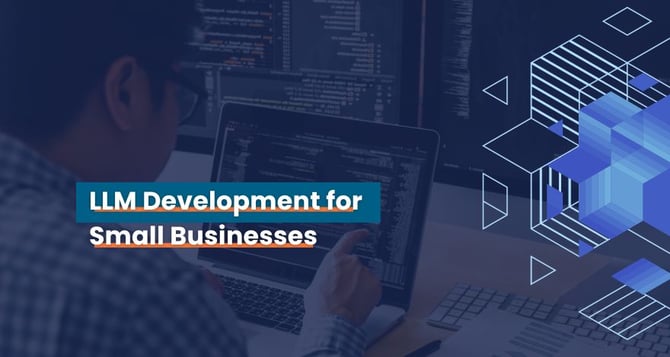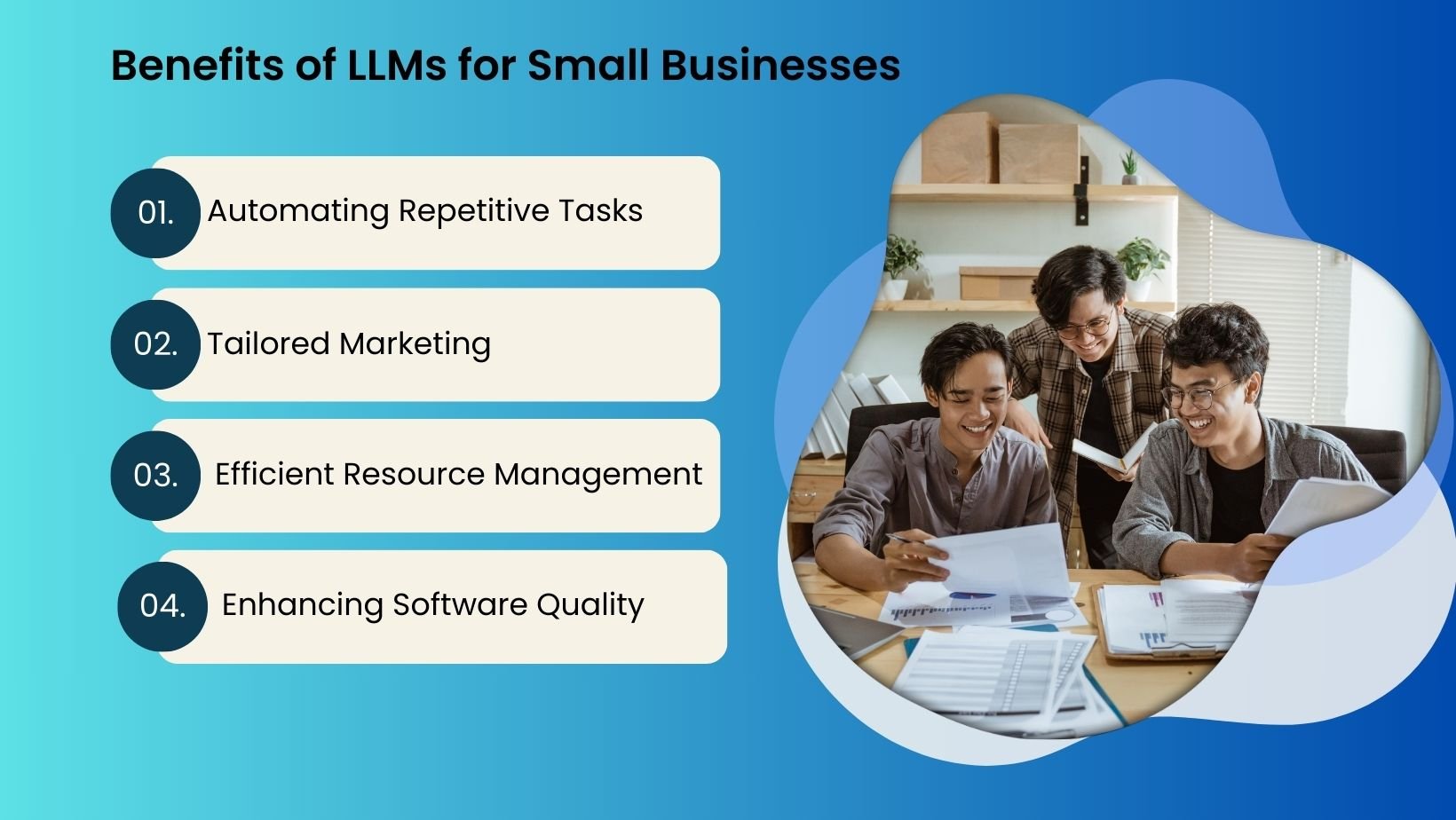Streamlining Operations with LLM Development for Small Businesses
Empower your small business with LLMs: Automate tasks, improve efficiency, and cut costs. Learn everything about LLM development and how it can streamline operations for small businesses to big organizations in this blog post.

In today’s era where Artificial Intelligence is swiftly moving from the talk of town to being an inevitable part of doing business, one branch of AI, known as Large Language Models is becoming the preferred choice, the one that everyone wants.
Small businesses are especially leveraging the power of LLM to enhance both internal communication and customer-facing functionalities to propel their growth. Indeed, a study by Unbounce stated that nearly 30% of small and medium-sized businesses are presently using AI solutions.
In a nutshell, AI offers a wealth of opportunities for small businesses, right from upholding customer service to streamlining operations and boosting marketing strategies. Herein, we’ll explore how you can leverage LLM to the most to thrive in the competitive market.
First and foremost let’s have a quick recap of what LLM is.
A Short Description of LLM (Large Language Model)
Large Language Models (LLMs) are advanced artificial intelligence systems designed to understand and generate human-like text. These models, such as OpenAI's GPT (Generative Pre-trained Transformer) series, are trained on vast amounts of text data to learn the patterns, structures, and nuances of human language.
LLMs utilize deep learning techniques, particularly transformer architectures, to process and generate text. They consist of multiple layers of neural networks that encode and decode information, allowing them to understand context, syntax, and semantics, and even generate coherent and contextually relevant responses.
We understand small businesses have their hands tied by everyday challenges, but now is the time to handhold the power of LLM, thrive in the competitive world, and be the game-changer.
But, if you are still at square one wondering - is LLM the helping hand that your business needs? Don’t worry, we’ve got you covered!
Interesting? Though, that’s the tip of the iceberg, let’s dive a little deeper and unfurl the wealth of strategic advantages an LLM can offer in an ever-evolving commercial landscape.
How LLM Streamlines Small Business Operations?
In the past years, data analytics used to be a large organization's thing, now even entrepreneurs, startups, and SMEs can tap easily into these resources with Artificial Intelligence solutions.
Let’s see how!
-
Data Analysis and Insights: LLM can process large volumes of data to provide valuable insights into operational inefficiencies, customer preferences, and market trends. By analyzing data, small businesses can identify areas for improvement and make informed decisions to streamline operations.
-
Process Optimization: LLM can offer optimization recommendations for various business processes based on industry best practices and historical data. This can help small businesses streamline their workflows, reduce waste, and enhance productivity.
-
Automation and Efficiency: LLM can assist in automating repetitive tasks, thereby freeing up time for employees to focus on high-value activities. This automation can lead to increased operational efficiency and reduced manual workload.
-
Customer Interactions: LLM can be utilized for managing customer interactions, such as answering inquiries, providing support, or even personalizing marketing efforts. This can streamline customer service operations and enhance the overall customer experience.
-
Forecasting and Planning: LLM can provide predictive analytics to aid in demand forecasting, inventory management, and resource planning. This can help small businesses optimize their operations by aligning resources with anticipated demand.
Benefits of LLMs for Small Businesses
LLMs can benefit small businesses in several ways, including enhancing internal efficiency by streamlining communication, automating content generation, and enabling tailored marketing.

Here are some benefits of LLMs for small businesses:
- Automating Repetitive Tasks: LLMs can automate many repetitive and time-consuming tasks, such as data entry, customer support, and content generation. This can free up employees to focus on more strategic and value-added work while also reducing the risk of human error.
- Tailored Marketing: LLMs can help small businesses understand their customers better, providing insights into their language, behavior, and preferences. This can be invaluable in crafting personalized marketing messages and campaigns that resonate with the target audience.
- Efficient Resource Management: LLMs can aid in tasks like project management and scheduling, automating these processes and freeing up more time for small business owners and their teams to focus on strategic decision-making and creative tasks.
- Enhancing Software Quality: For small businesses developing software products or using custom software tools, LLMs can analyze code to identify potential errors or inefficiencies, thereby improving the quality of the software and ensuring a smoother, more reliable user experience.
Role of LLM in Customer Service
Unquestionably, customer service is the key to moving the needle and attracting as well as nurturing long-term clients for businesses of any size. Especially, when AI is a part of your business, you take your customer service to the next level.
- Personalized Recommendations: AI-driven personalized product recommendations based on customer data enhance engagement and drive targeted marketing.
- Chatbots: AI-powered chatbots deliver instant support, improve response time, and elevate customer satisfaction through round-the-clock service.
Role of LLM in Marketing
It’s not only confined to streamlining operations and customer service, indeed integrating Large Language Models makes a huge difference in your marketing efforts enabling you to make great strides.
- Managing Social Media: LLM tools analyze social media data to tailor marketing strategies, resulting in amplified brand reputation and increased engagement.
- Predictive Analytics: AI enables the understanding of customer behavior and preferences, optimizing marketing campaigns for higher effectiveness and ROI.
Role of LLM in Finance
Large Language Models (LLMs) are revolutionizing finance operations by leveraging their advanced natural language processing and machine learning capabilities. These models have the potential to analyze vast amounts of financial data, including reports, news articles, and market trends, with a level of efficiency and precision that was previously unattainable.
-
Enhanced Financial Analysis: LLMs enable comprehensive analysis of financial reports, news articles, and extensive datasets, empowering swift and well-informed decision-making by financial analysts.
-
Improved Risk Assessment: LLMs excel at evaluating lending risks and investment prospects, providing financial institutions with more accurate risk assessments and informed risk management strategies.
Ready to Implement LLMs? Get Expert Guidance
Overcome implementation challenges with expert guidance on adopting Large Language Models. Connect now!
Challenges and Solutions of Implementing LLMs
1. Challenge: Resource Requirements:
Training and fine-tuning LLMs require substantial computational resources, leading to high hardware demands and energy consumption.
Solution: Prompt engineering can help mitigate the high resource requirements by crafting targeted prompts that are optimized for the specific task at hand.
2. Challenge: Cost of Development and Training:
The high cost of LLM development and training has been a barrier to entry for many small businesses.
Solution: Deploying and training LLMs is becoming more affordable and accessible, thanks to strategies like fine-tuning and the availability of user-friendly tools and platforms.
3. Challenge: Lack of Pricing Transparency:
Some LLM providers may not disclose their pricing upfront, making it challenging for small businesses to accurately budget for LLMs.
Solution: With today’s user-friendly tools and platforms, even non-technical entrepreneurs can leverage the power of LLMs, making it feasible for small businesses to adopt the technology.
4. Challenge: Technical Complexities:
Implementing LLMs can be technically complex, especially for businesses without AI and machine learning expertise.
Solutions: Small businesses can partner with third-party providers or experts to overcome the technical complexities of implementing LLMs.
By leveraging these solutions, small businesses can overcome the challenges of implementing large language models (LLMs) and harness the technology to streamline operations and improve efficiency in large language model development.
Here’s How Signity Can Help
Establishing AI solutions like Large Language Models in business operations is a significant move that comes with magnificent advantages. So, the time you navigate the potential red flags and challenges of using AI, establishing AI can save a significant amount of time, effort, and finances in real.
Are you ready to be a part of this AI Revolution? Signity offers tech-forward solutions for businesses of every size, same as AI, that shed the onus and let you focus on scaling your business. Plus, our software solutions help businesses like you automate HR to accounting processes.


%201-1.webp?width=148&height=74&name=our%20work%20(2)%201-1.webp)


.png?width=344&height=101&name=Mask%20group%20(5).png)







.jpg?width=352&name=Top%20Large%20Language%20Models%20(LLMs).jpg)








